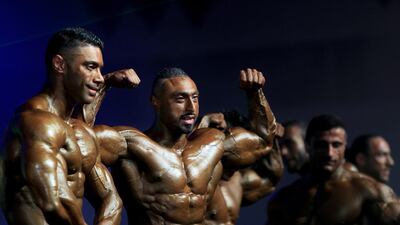FUJAIRAH // Musclemen from across the region and beyond descended on the emirate on Friday night in an attempt to flex their way to a Dh10,000 bodybuilder prize.
More than 100 sculpted and bronzed bodies from seven countries – the UAE, Syria, Iran, Kuwait, Saudi Arabia, Nepal and the Philippines – were present for the 14th edition of the Fujairah Classic Bodybuilding Championships, where men were competing in three weight categories, under 75kg, under 85kg and over 85kg.
Judging by the sizeable crowd in the hundreds, the sport seems to be taking off in the UAE and many visitors were impressed by the balance, power and physiques shown by participants.
“It is the first time I have attended a live event for this kind of sport,” said 22-year-old Emirati Jihad Hamad.
“I used to watch it on TV but it is totally different, the atmosphere is very energetic. I feel like going to the gym right now and start building my muscles.”
Filipino Edwin Marcia, 25, is a bodybuilding fan. He said: “The event is well organised. I came all the way from Al Ain to attend this championship and I wish that one day I would become one of the participants.
“I work as a fitness instructor and by working so hard on myself, I could be able to make my dream come true.”
The championship began with an impressive bodybuilding show by 12-year-old Hussain Khalil.
After that it was down to business as competitors in each category vied for a winner’s cheque of Dh10,000, with runners up getting Dh7,000 and third-placed finishers earning Dh5,000. The overall winner also got an extra Dh3,000.
Filipino participant Romio Arnado, who took second place in the under 75kg category, said: “This is my third competition here in UAE. I am so excited and happy to participate in such a great event.
“I like what I do because it is challenging and needs serious dedication. I’m 14 years in practice and still improving.”
He was beaten by Syrian Firas Tahan, while third place went to Iranian Mohammed Ali.
In the under 85kg category the gold medal went to Syrian Zouher Kamel, with Filipino Kareland claiming second place. Iranian Ahmad Jafer earned the third spot.
Finally, in the heavyweight over 85kg category, which witnessed fierce competition, Abdulhadi Mohammed, from Kuwait, eventually walked away with the gold medal, along with the Champion of the Champs award. Emirati Sulaiman Abdulrahman had to settle for second place, while Sulaiman Abdullah, of Kuwait, finished third.
The tournament was organised by the Department of Industry and Economics in collaboration with the UAE Bodybuilding Federation and the Asia Bodybuilding and Physique Federation. It was held at the Fujairah Tennis & Country Club with 12 judges making up the judges’ panel.
newsdesk@thenational.ae

